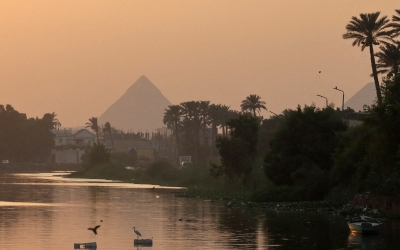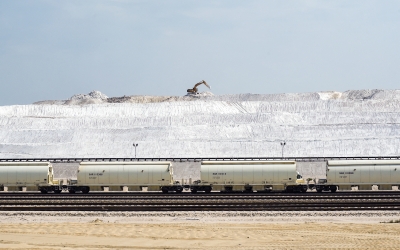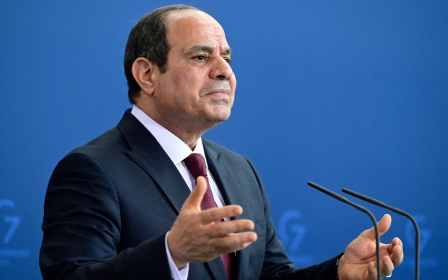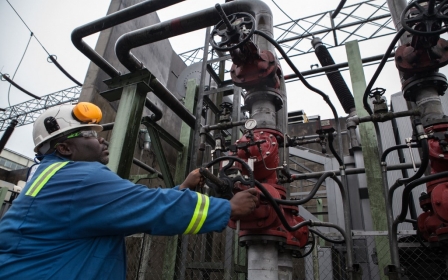Egypt and Qatar find 'synergies' in post-Ukraine Middle East
Egyptian President Abdel Fattah el-Sisi’s visit to Qatar is the latest sign of deals winning over ideals as the Middle East grapples with the fallout from the war in Ukraine, fears of a slumping global economy and an uncertain geopolitical future.
Ties between Egypt and Qatar have been strained since Sisi rose to power in 2014, following the military’s overthrow of former President Mohamed Morsi.
New MEE newsletter: Jerusalem Dispatch
Sign up to get the latest insights and analysis on Israel-Palestine, alongside Turkey Unpacked and other MEE newsletters
In 2017, Egypt, led by Saudi Arabia and its Gulf allies, the UAE and Bahrain, boycotted Doha over its support for the Muslim Brotherhood and Islamist movements the countries labelled “terrorists”. Qatar denied the allegations.
In a stark reversal from a few years ago, Sisi was pictured in Doha on Tuesday smiling and clasping hands with Qatar’s emir, Sheikh Tamim bin Hamad Al Thani.
“The visit is remarkable because the relationship was very strained,” Robert Mogielnicki, senior researcher at the Arab Gulf States Institute in Washington (AGSIW), told Middle East Eye.
Egypt was a focal point of the tensions, with Cairo accusing Doha of interfering in its internal affairs and using the state-funded Al Jazeera news network to attack it in the press.
“It’s another indication that regional governments are putting aside their recent history of tension in the hopes that they can strengthen economic ties,” Mogielnicki said.
LNG windfall
Egypt and Qatar have been working to mend the bilateral relationship since the blockade against Doha was lifted in 2021.
Earlier this year, a Qatari-funded luxury hotel whose reopening had been stalled due to the diplomatic rift was inaugurated in Cairo. In June, the Qatari emir made his first visit to Egypt since 2015. Qatar has also pledged to invest $5bn dollars in Egypt’s struggling economy.
The thaw in ties highlights many of the factors that have emerged post-pandemic and, more recently, after Russia’s invasion of Ukraine.
'For Doha, being perceived as a responsible supplier of LNG is in, and serving as a platform for political Islam is probably less relevant'
Robert Mogielnicki, AGSIW
While Doha never conceded to its neighbours’ demands to end the blockade, which included shuttering Al Jazeera, analysts say it has given a nod to Egypt by toning down some of its rhetoric against the government and support for opponents of Sisi.
“The rapprochement is not just a matter of money,” Mirette Mabrouk, founding director of the Middle East Institute’s Egypt programme, told MEE.
“If Qatar had offered funds to Egypt before al-Ula, they wouldn’t have taken it, even if they badly needed it,” Mabrouk said, referring to the agreement signed between Qatar and its neighbours in the Saudi city that restored diplomatic ties.
But Qatar weathered the blockade and has seen its global influence grow, along with that of other Gulf states, because of the war in Ukraine.
As the world’s largest exporter of liquefied natural gas (LNG), the country of three million is at the centre of a global scramble for energy that is boosting its economic fortunes and political heft.
“For Doha, being perceived as a responsible supplier of LNG is in, and serving as a platform for political Islam is probably less relevant today,” Mogielnicki said.
Meanwhile, Egypt, already one of the Arab world’s most indebted nations, has been hit hard by the pandemic and war. The country depended on Russia and Ukraine for both tourists and wheat supplies.
In March, Egypt was forced to devalue its pound by 15 percent as the country faces a foreign currency shortage and rising inflation against the backdrop of a slowing global economy.
Opportunities abound
Deepening economic ties are high on the agenda for Sisi’s trip. On Wednesday, the two countries signed three memoranda of understanding, including one between their sovereign wealth funds.
“Cairo will appreciate Qatar's investments not only for their own sake, but because it will help to improve international perceptions of Egypt's economy and may give officials more breathing space in negotiations with the IMF over a new loan,” Hamish Kinnear, an analyst with Verisk Maplecroft, a risk advisory firm, told MEE.
But Qatar is unlikely to match the economic firepower of Saudi Arabia and the UAE.
Both countries have been investing heavily in Egypt in an effort to help ease their ally’s financial strain. Emirati investments in Egypt more than doubled during the first half of the 2021-2022 fiscal year. Oil-rich gulf states have been scooping up assets, from banks and ports to fertiliser companies.
“Investments from the Gulf have been a lifesaver to the Egyptian economy, but Egypt is also a good place to do business,” Mabrouk said. “This money isn’t charity - it’s investments and the Gulf expects to make their money back.”
Real estate in Egypt has historically been a profitable investment for Gulf states. In more recent years they have sought opportunities in renewable energy. With a population of over 100 million, the North African country also offers its capital-rich neighbours scaleability. Egypt has a burgeoning fintech industry and promising tech companies such as Fawry.
“There is a great opportunity for Gulf states to acquire discounted assets. Despite growing poverty, Egypt is still the largest country in the region and maintains a significant consumer market," Adel Hamaizia, associate fellow with the Middle East and North Africa programme at Chatham House in London, told MEE.
Qatar has already started to move on some deals. In March, hydrocarbon giant QatarEnergy announced an agreement with ExxonMobil to acquire a 40 percent stake in a gas exploration block off Egypt’s Mediterranean coast.
One bright spot for Egypt’s economy has been its burgeoning role as an LNG exporter. Earlier this year it signed a deal with Israel to supply gas to Europe. Egypt is aiming to fill the void on the continent left by Russia and has cut its own gas consumption to export more.
Synergies
Analysts say LNG could be a natural sector for Qatar-Egypt cooperation. Doha may look to Egypt to fill its gaps in Red Sea port access as it aims to boost its own gas shipments to Europe.
“There may be synergies in the future that bring together Egyptian port infrastructure and the growing energy market for Qatar in a post-Ukraine-war space,” Hamaizia said.
Egypt is likely to welcome Qatar as an additional bidder as it privatises state assets. The Qatar Investment Authority (QIA) has joined Saudi Arabia’s Public Investment Fund and Abu Dhabi’s sovereign wealth fund looking to acquire a stake in Vodafone Egypt, a partially state-owned telecom giant.
'There may be synergies in the future that bring together Egyptian port infrastructure and the growing energy market for Qatar'
Adel Hamaizia, Chatham House
Qatar’s appetite to invest in Egypt could also serve as a benchmark for how the rapprochement progresses in the political sphere.
In hotspots such as Libya, Qatar and Egypt have both shown some willingness to compromise. Doha was a central backer of the now defunct Government of National Accord (GNA) in Tripoli, but has since hosted leaders from Libya’s eastern government. Qatar is also more closely aligned with Egypt on issues like the Grand Ethiopian Renaissance Dam than the UAE.
“The Qatari emir would not have gone to Cairo, and the Egyptian president wouldn’t be in Doha if there were huge gaps in their perception of conflicts in the region. The leaders are there to shake hands and discuss things they want to move forward like investment,” Mabrouk said.
Qatar will also have to navigate Egypt’s military-dominated economy. While Sisi is pursuing the privatisation of some state assets to raise funds, he has inserted the army into nearly every aspect of economic life.
"A big question is whether Qatar and other Gulf states will compete in Egypt’s market, or coordinate their investments and potentially create more value,” Hamaizia said.
Middle East Eye delivers independent and unrivalled coverage and analysis of the Middle East, North Africa and beyond. To learn more about republishing this content and the associated fees, please fill out this form. More about MEE can be found here.






